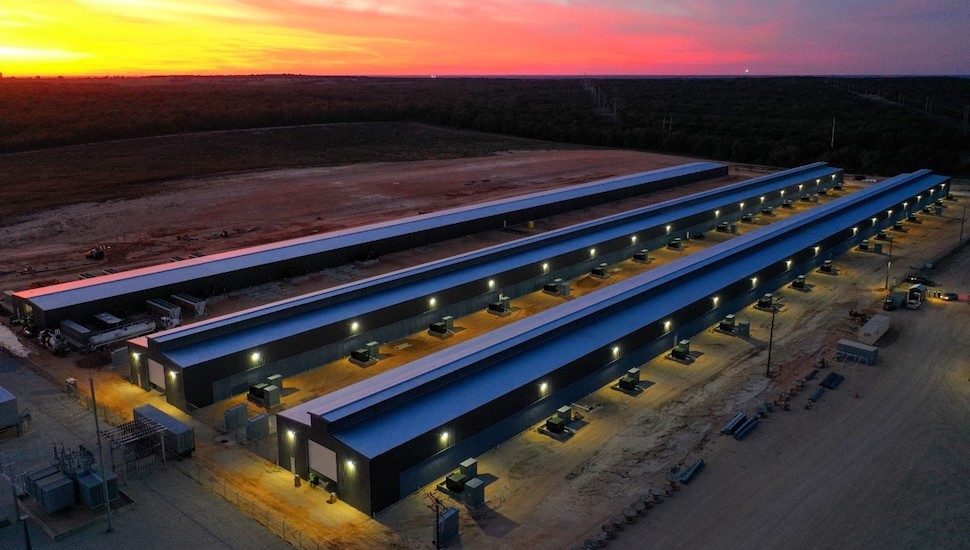A cryptocurrency miner is planting its flag in North Texas and investing hundreds of millions of dollars in one of its biggest facilities to date.
Colorado-based Riot Blockchain, one of the world’s largest publicly traded bitcoin mining companies, announced plans to develop a 265-acre site in Corsicana—about an hour south of Dallas—adding to its growing presence in the Lone Star State.
“This expansion is a testament to the company’s demonstrated ability to build and deliver high-quality, large-scale digital asset infrastructure for its bitcoin mining operations and future hosted clients,” said Jason Les, Riot CEO, in a statement.
Investing $333M, creating about 270 new jobs

Jason Les, CEO of Riot Blockchain. [Photo: Jason Les/Twitter]
At full capacity, the development is expected to have one gigawatt (GW) of capacity—enough energy to power around 750,000 households. For the first phase of the project, which will have 400 megawatts (MW) of capacity, Riot is investing $333 million for things like site preparation and construction on buildings to house the company’s immersion-cooling technology. The facility is expected to begin mining and hosting operations next July and to create about 270 direct jobs when the first phase comes online.
As part of the effort, Riot has partnered with Arlington-based energy solutions provider Priority Power to provide site development, utility interconnection, power purchase agreements, and power load flexibility services.
Once fully completed, Riot said the Navarro County facility will bring its total energy capacity to 1.7GW.
The Corsicana expansion comes as Riot is building out a facility it operates in Rockdale, Texas, about an hour south of Waco. Riot acquired the 300MW Rockdale facility as part of its acquisition of fellow bitcoin mining and hosting company Whinstone US in a $651 million cash and stock deal last year. Riot is currently expanding that facility to have a capacity of 750MW. Riot said the proximity between the two facilities will help it source talent for the Corsicana facility.
“The acquisition of Whinstone is the most significant achievement in Riot’s growth to date,” Les said at the time.
Boosting the bitcoin balance sheet
The move also comes less than a month after Riot, which trades on the Nasdaq under the ticker RIOT, filed paperwork to sell up to $500 million in shares through an at-the-market offering, with funds being potentially used for investing in current and future projects. In 2021, Riot reported a total revenue of more than $213 million, a 1,665% increase from the previous year. As of last month, the company said it held nearly 5,800 bitcoins on its balance sheet, an amount equivalent to more than $232 million today.
“This expansion is a key example of the positive environmental, societal, and economic impacts that Bitcoin mining brings to under-developed regions in America,” said Chad Harris, CEO of Whinstone, in a statement
North Texas’ growing crypto-mining industry
According to KPMG, investment in crypto and blockchain topped $30 billion in 2021—more than the previous three years combined—and North Texas is quickly becoming a hub for activity in the space. In addition to hosting companies operating in the space like Dallas’ Applied Blockchain, which went public earlier this month, the region is also home to the Texas Blockchain Council, which has been fostering public-private partnerships in the space and donated bitcoin mining machines to the city of Fort Worth, making it the first U.S. city to mine the cryptocurrency.
It’s not just the talent pool and density of companies in the industry bringing crypto-mining companies to the state. Aided by a government crackdown on mining operations in China, which hosted 75% of the world’s bitcoin miners at its peak—over concerns of financial stability and environmental impact—Texas has been looking to attract operators in the space. According to CNBC, crypto-mining businesses are attracted to Texas due to its relatively low energy costs, access to renewable resources, and the state’s large amount of available land. There are currently around 30 Texas-based bitcoin mining companies, according to TechCrunch.
“While regulatory uncertainty is currently the biggest barrier to adoption, Texas is well suited to be a leader in this space,” the Texas Blockchain Council wrote in its “Legislator’s Toolkit for Blockchain Technology” last March. “By providing clear legal guidelines, Texas can give its blockchain industry a competitive advantage over those in other jurisdictions.”
![]()
Get on the list.
Dallas Innovates, every day.
Sign up to keep your eye on what’s new and next in Dallas-Fort Worth, every day.





























